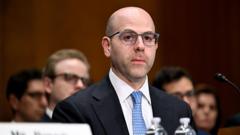Will Trump's Fed Pick Stay in the White House?

Published: 2025-09-04 18:30:10 | Category: technology
Stephen Miran, President Donald Trump's nominee for a vacant position on the Federal Reserve, has stirred controversy by indicating he does not plan to resign from his White House role if confirmed. This move raises concerns among Democrats about the potential for increased presidential influence over the central bank, which is traditionally expected to operate independently.
Last updated: 02 October 2023 (BST)
Key Takeaways
- Stephen Miran intends to maintain his White House position while serving in a short-term role at the Federal Reserve.
- Democrats express concerns over his independence and potential political influence on monetary policy.
- The Federal Reserve's independence is a crucial aspect of its ability to manage the economy effectively.
- Miran's nomination is likely to progress to a Senate vote, where Republican support is expected.
- Senators from both parties emphasise the need for monetary policy to remain free from political pressure.
The Role of the Federal Reserve
The Federal Reserve, often referred to as the Fed, serves as the central bank of the United States. Its primary responsibilities include regulating monetary policy, managing inflation, and stabilising employment levels. Established in 1913, the Fed operates independently of the executive branch to ensure that economic decisions are made based on data and analysis rather than political motivations.
The independence of the Fed is paramount, as it helps maintain trust in the financial system. When the Fed is perceived as acting in the interest of political leaders rather than economic stability, it risks losing credibility, which can lead to adverse economic consequences.
Stephen Miran’s Background
Stephen Miran currently serves as the chief economist on Trump’s Council of Economic Advisers. With a background in economics from Harvard, Miran has been involved in shaping economic policy during Trump's presidency. His recent nomination to fill the vacancy left by former governor Adriana Kugler adds to the ongoing debate surrounding the Fed's independence amid increasing political pressures.
Concerns About Independence
During his confirmation hearing, Miran expressed his commitment to the Fed's independence. However, his decision to retain his White House post has drawn scrutiny from Democrats, who worry that he may not act independently. Senator Elizabeth Warren articulated these concerns, suggesting that Miran could be perceived as a "puppet" of Trump, compromising the Fed's ability to operate free from political influence.
Lawmakers questioned Miran's stance on various issues, including Trump's unfounded claims regarding job data manipulation and his previous recommendations regarding the appointment of political figures to the Fed. Miran's reluctance to explicitly affirm the legitimacy of the 2020 election results further fueled these concerns.
Political Pressures on the Federal Reserve
President Trump has been vocal about his desire for the Fed to lower interest rates, using his platform to criticise chair Jerome Powell and other officials. The president has even hinted at firing Powell and has taken steps to dismiss board member Lisa Cook over unverified allegations of misconduct. Such actions have raised alarms among economists and lawmakers about the potential erosion of the Fed's credibility.
As the Fed is tasked with maintaining economic stability, any perception of political interference could undermine its effectiveness. Economists warn that if the Fed becomes a political tool, it could lead to long-term negative consequences for consumers, workers, and businesses alike.
Bipartisan Concerns
While Republicans have generally supported Miran's confirmation, bipartisan concerns regarding the Fed's independence have emerged. Senator Jack Reed referred to Miran's decision to hold both positions as "ridiculous," while Senator Andy Kim questioned the motives behind seeking a temporary role while remaining embedded in the White House. These sentiments reflect a shared apprehension about the implications of such dual roles.
The Path Forward for Miran’s Nomination
Miran’s nomination is expected to advance to a full Senate vote, where Republican support is likely to prevail due to their majority. Senator John Kennedy encouraged Miran to prioritise economic integrity over political influences, underscoring the importance of maintaining an independent stance at the Fed.
As discussions continue, it remains to be seen how Miran will navigate the delicate balance between his roles and the expectations surrounding the Fed's autonomy. The outcome of his nomination could set a precedent for future appointments and the relationship between the Fed and the White House.
Conclusion
The nomination of Stephen Miran to the Federal Reserve has ignited a heated debate about the independence of the central bank amid increasing political pressure. As he prepares for a potential Senate vote, the implications of his dual roles are being scrutinised closely. The future of the Fed's independence hangs in the balance, and the economic repercussions of this nomination could resonate for years to come. How the Senate chooses to proceed will be crucial for the credibility of the Fed and its ability to function as an independent institution.
#FederalReserve #StephenMiran #EconomicIndependence
FAQs
What is the role of the Federal Reserve?
The Federal Reserve serves as the central bank of the US, tasked with managing monetary policy, regulating banks, and ensuring economic stability through tools like interest rates and reserve requirements.
Why is the independence of the Federal Reserve important?
Independence is crucial for the Fed to make unbiased decisions based on economic data rather than political pressures, ensuring long-term stability in prices and employment.
Who is Stephen Miran?
Stephen Miran is the chief economist for Trump's Council of Economic Advisers and has been nominated to fill a vacancy on the Federal Reserve's board, with a background in economics from Harvard.
What are the concerns about Miran's nomination?
Concerns centre around his decision to retain his White House role, which raises questions about his ability to act independently and avoid political influence on monetary policy.
What happens next in the confirmation process?
Miran's nomination is expected to move to a full Senate vote, where Republican support is anticipated, despite bipartisan concerns about the implications for the Fed's independence.



